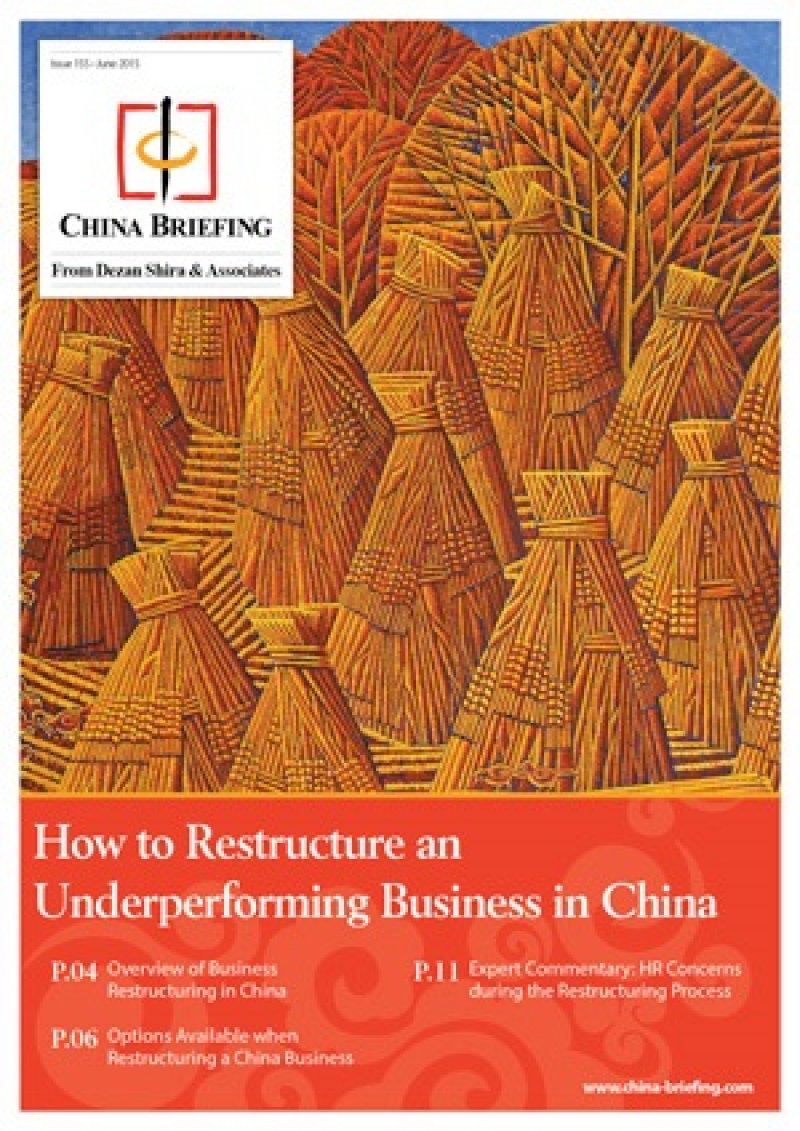Is China Getting More Difficult? Common Problems that Foreign Companies will Encounter
Op/ed by Daniel R. Joseph
Just how difficult is it for a foreign company to succeed in China? When I started in China in the mid-1990’s, failure hung over the foreign business community like a thick fog. No one was making money. It wasn’t uncommon to see companies implode, i.e., make an investment, write-off the investment a short time later, and either head for the exit or start from scratch all over again.
Times have changed. In many ways, particularly administratively, China is easier. For example, partnerships are not required in as many industries. The rules are often (though not always) a bit clearer and a bit fairer. Surveys consistently reveal that 80+ percent of foreign companies in China are making money, while companies like Apple and industries like automobiles show it is possible for foreign companies to do very well in China.
Companies continue to struggle
But we still see companies struggle. There have been fairly high profile failures in tech, retail, food, and finance, just to name a few industries that have been in the spotlight for the wrong reason over the last few years. As any consultant, accountant, or lawyer active in China will tell you, below the companies making headlines there are plenty more companies struggling to make the most of China.
Of course, lately there has been much discussion of other challenges in China, such as the slowing economy and legal problems related to issues like corruption and anti-trust. Putting these kind of issues aside for a moment, and focusing simply on the challenge of managing for success in China, below are a few reasons why we continue to see companies struggling in China.
![]() RELATED: Business Advisory Services from Dezan Shira & Associates
RELATED: Business Advisory Services from Dezan Shira & Associates
New Sectors
While some sectors, like autos or industrial, have been active in China for a few decades, others, like tech, retail, and financial services, are still relatively new. It always seems like each sector and each company has to navigate the learning curve on its own.
New Entrants
Ask most companies who are doing well in China and they will tell you that it didn’t start that way for them. Trial and error seems to be a common way of learning, a testimony as to how challenging China can be. When new entrants in new sectors get involved in China, the success of other companies doesn’t necessarily mean they won’t have to learn a few lessons the hard way.
Stages, transitions, and complexity
Most foreign companies get involved in China in stages. For example, they source through an agent, source directly, then manufacture. Or they first export to China, then hire sales staff, then build a plant. Each transition usually requires the company to undertake a new activity for which it has limited experience in China. Plus, as the company grows and diversifies its activities, it increases the overall complexity of the operation, which also increases the management challenge.
Performance matters: Expectations have risen
In the old days, when horror stories were common and no one was making money, expectations were low, which helped to ease the pain of red ink and underperformance. Today things are different. Growth prospects are not as strong as they used to be in the developed world. Companies are looking to emerging markets for profits, and, even given China’s current economic headwinds, most companies are looking for growth in China over the long term. It is an important part of the plan, and often, for public companies, goals and expectations have been transmitted to shareholders. The bar has been raised. Failure no longer is an option.
New type of failure: Stuck in the mud
Total failure has become less common, though not unheard of, in China. But another risk is becoming more common: the inability to make progress, or, as I like to put it, the risk of getting stuck in the mud. You are in China but you aren’t getting anywhere. You are not failing, but at the same time you can’t seem to keep things on track. Of course this kind of situation becomes more painful when expectations are higher.
China is difficult because China is still early in its development
Perhaps the most important point to make is that China is still relatively early in its development. Per capita GDP is less than one quarter of developed economies. Half the population still lives on the farm, barely making a living. The gradual transition from communism to capitalism is still mid-stream. China is perhaps about half way across, depending on how you measure. Our collective knowledge and experience relative to emerging markets is still fairly thin. We therefore shouldn’t expect our troubles to go away so quickly.
|
Asia Briefing Ltd. is a subsidiary of Dezan Shira & Associates. Dezan Shira is a specialist foreign direct investment practice, providing corporate establishment, business advisory, tax advisory and compliance, accounting, payroll, due diligence and financial review services to multinationals investing in China, Hong Kong, India, Vietnam, Singapore and the rest of ASEAN. For further information, please email china@dezshira.com or visit www.dezshira.com. Stay up to date with the latest business and investment trends in Asia by subscribing to our complimentary update service featuring news, commentary and regulatory insight. |
![]()
How to Restructure an Underperforming Business in China
In this issue of China Briefing magazine, we explore the options that are available to foreign firms looking to restructure or close their operations in China. We begin with an overview of what restructuring an unprofitable business in China might entail, and then take an in-depth look at the way in which a foreign company can go about the restructuring process. Finally, we highlight some of the key HR concerns associated with restructuring a China business.
 China Investment Roadmap: the Commercial Real Estate Sector
China Investment Roadmap: the Commercial Real Estate Sector
In this issue of China Briefing, we explore the latest trends in commercial real estate in China, and discuss how foreign companies can benefit from China’s massive construction boom. We provide a guide to how firms can sell construction materials in China, and finally detail how foreign architects can most effectively enter and take advantage of China’s rapid urbanization.
 An Introduction to Doing Business in China 2015
An Introduction to Doing Business in China 2015
Doing Business in China 2015 is designed to introduce the fundamentals of investing in China. Compiled by the professionals at Dezan Shira & Associates, this comprehensive guide is ideal not only for businesses looking to enter the Chinese market, but also for companies that already have a presence here and want to keep up-to-date with the most recent and relevant policy changes.
- Previous Article A Period of Change: Current Import and Export Trends in China
- Next Article Selling, Sourcing and E-Commerce in China 2016 – New Publication from China Briefing










